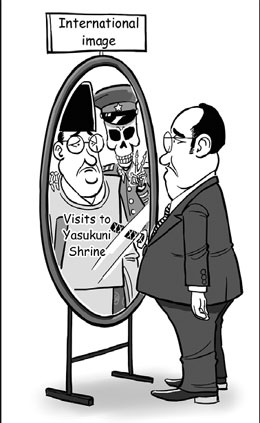Japan must soften to win hard 'battle'
Updated: 2007-08-09 07:28
This year marks the 70th anniversary of the beginning of Chinese People's War of Resistance against Japanese Aggression and the 35th anniversary of the normalization of diplomatic relations between Japan and China.
We should be pleased that a friendship has developed between the two despite the bitter legacies of the bloody war, which was an unfortunate chapter in the history of the relationship. Naturally, however, some sores remain between the Asian powers.
The immense economic power wielded by each inevitably causes regional friction from time to time.
Despite the rivalry, Japan and China can learn a lot from each other once they realize they have widely different strengths.
Let us use the concepts of "soft power" and "hard power" in analyzing the situation. The "hard power" of a country is its industrial and military might, while "soft power" is its diplomatic and cultural strength.
In the initial phase of the war between Japan and China, which lasted for eight years from 1937, Japanese forces won battles against Chinese troops as Japan's hard power, underpinned by its industrial and military strength, prevailed.

In the second part of the war, however, China astutely used its soft power, symbolized by its great diplomatic prowess, to turn the tables on Japan. China successfully maneuvered to push Japan into international isolation, which was one of reasons China defeated Japan in August 1945.
After World War II, Japan achieved rapid economic recovery as a member of the Western bloc, with great support from the United States.
After years of high economic growth Japan eventually became the world's No 2 economic power behind the US.
During this period, Japan focused mainly on bolstering its hard power by doing what it does best - building up industries. As a result, high-quality Japanese products flooded markets around the world.
But Japan's economic development in the postwar era was not accompanied by an increase in its soft power. The country's diplomatic performance remained lackluster. But Tokyo managed to get through this period without making serious diplomatic blunders thanks to the relatively simple geopolitical picture of the East-West confrontation in the Cold War era. That left little room for complicated diplomatic maneuvers.
Since the beginning of the 21st century, however, Japan has faced a new diplomatic challenge: China's rapid development in East Asia, driven by a combination of its enormous soft power and its newly acquired hard power.
In order to co-exist with an increasingly powerful China in a harmonious relationship, Japan urgently needs to bolster its soft power.
It needs to build an image for itself that appeals to countries throughout Asia and the rest of the world.
An image of Bae Yong Joon, or Yon-sama, driving a Hyundai Pony with a Samsung cell phone in his hand is received far more favorably by Asian audiences than that of former Primer Minister Junichiro Koizumi visiting Yasukuni Shrine. The South Korean actor is contributing greatly to enhancing his country's international image. We must understand this.
Strengthening soft power requires organizing, publishing and properly controlling information. In particular, organizing historical materials is crucial for a country's efforts to improve its diplomatic strategy. It is becoming ever more important for countries to make publicly available crucial historical records before its diplomatic partners do.
Earlier this year, the Republic of Korea (ROK) declassified and made public records about the negotiations for the normalization of its diplomatic relations with Japan, and the 1973 abduction in Tokyo of South Korean politician Kim Dae Jung, who later became the country's president. Japan should have been the first to offer public access to these records.
Japan was once known as a culturally sophisticated Asian country. But that was only because of its superior hard power. In terms of soft power, Japan has been lagging behind countries like the ROK.
In order to compete favorably in the soft power contest with these Asian rivals, Japan needs to disclose, rather than conceal, important information and use it effectively for its diplomatic advantage.
To commemorate the 70th anniversary of the war with China in a meaningful way, Japan must learn lessons from its defeat in the war and launch fresh efforts to increase its soft power.
The author is a professor of economic history at Waseda University. The Asahi Shimbun
(China Daily 08/09/2007 page9)
|
|
|
|
|
|